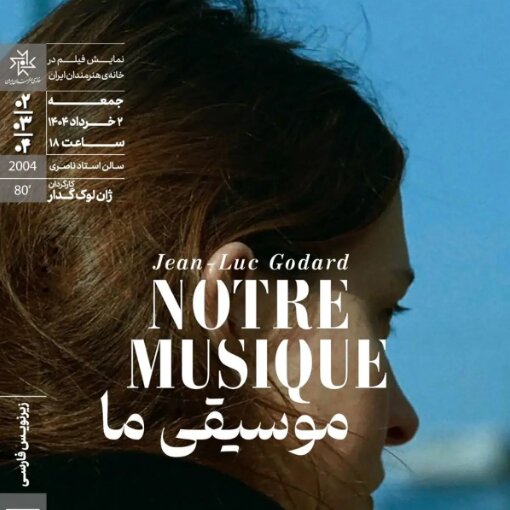IAF to show Jean-Luc Godard’s “Our Music”

TEHRAN – Jean-Luc Godard’s 2004 film “Our Music” will be screened at the Iranian Artists Forum (IAF) in Tehran on Friday.
Scheduled for 6 p.m., the 80-minute movie will be shown at the Nasseri Hall of the IAF with Persian subtitles, ILNA reported.
It is a three-chapter (Hell, Purgatory, and Paradise) meditation on the city of Sarajevo in the wake of the Bosnian war, on Palestine and Israel, and on war itself.
The film reflects on violence, morality, and the representation of violence in film, and touches especially on past colonialism and the current Israeli–Palestinian conflict. It was screened out of competition at the 2004 Cannes Film Festival.
The film is divided into three parts inspired by the Divine Comedy of Dante. “Realm 1: Hell” is a relatively brief, non-narrative montage composed of appropriated documentary and narrative fictional footage depicting war, carnage, and violence.
The second segment, “Realm 2: Purgatory,” makes up the bulk of the film. Godard, playing himself, is waiting at the airport to depart to a European arts conference in Sarajevo. There he meets Ramos Garcia, a nationalized French Israeli, who is going to the conference as an interpreter. Ramos is looking forward to seeing his niece at the conference, Olga Brodsky, a French-speaking Jew of Russian descent. Another young woman at the conference, Judith Lerner, a journalist from Tel Aviv, visits the French ambassador and entreats him to have an on-the-record conversation about Jewish-Palestinian relations. Later, she interviews the poet Mahmoud Darwish, who says that Israel defines the Palestinian struggle. In between these encounters, Judith surveys the city and visits the Mostar bridge, where she reads Emmanuel Levinas.
Meanwhile, Olga attends Godard's lecture, ostensibly about the relationship between image and text. In addition to touching on a variety of other topics, Godard explains his opposition to the common cinematic trope of “shot/reverse shot,” the cutting back and forth between two characters in a conversation or an exchange. Godard explains that presenting two characters in such a way, framed identically, regressively effaces their differences and can be used as a tool of propaganda. Later, Olga meets with her uncle Ramos and discusses with him the philosophical problem of suicide.
After the conference, Godard is back home, watering his garden. He gets a call from Ramos Garcia, who tells Godard about a young woman who ran into a theater and declared she had a bomb in her bag. She asked for one person to die with her for Israeli-Palestinian peace; everyone left the theater. The police came and shot her. When they opened her bag, all they found were books. Garcia tells Godard that he is sure it was Olga.
In “Realm 3: Heaven,” a brief postlude, Olga wanders contemplatively through an idyllic lakeside setting that appears to be guarded by American marines.
Jean-Luc Godard (1930-2022) was a French and Swiss film director, screenwriter, and film critic. He rose to prominence as a pioneer of the French New Wave film movement of the 1960s, alongside such filmmakers as François Truffaut, Agnès Varda, Éric Rohmer, and Jacques Demy. He was arguably the most influential French filmmaker of the post-war era.
He is said to have “generated one of the largest bodies of critical analysis of any filmmaker since the mid-20th century”. His work has been central to narrative theory and has “challenged both commercial narrative cinema norms and film criticism's vocabulary”. In 2010, Godard was awarded an Academy Honorary Award.
SS/SAB
